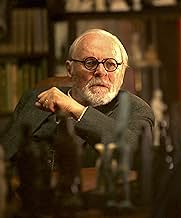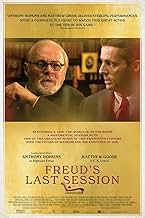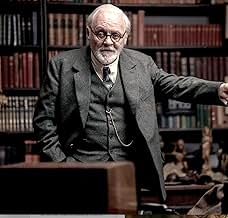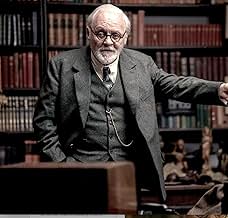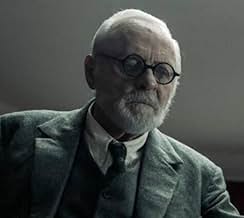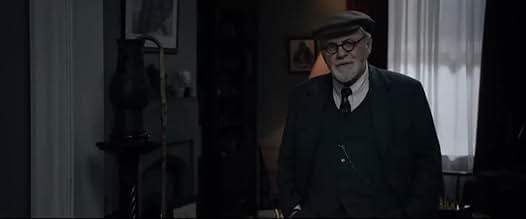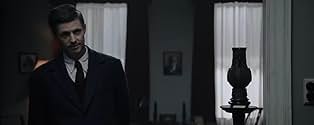In der Geschichte des Films lädt Freud den Kultautor C.S. Lewis zu einer Debatte über die Existenz Gottes ein. Und die einzigartige Beziehung zu seiner Tochter und Lewis' unkonventionelle Be... Alles lesenIn der Geschichte des Films lädt Freud den Kultautor C.S. Lewis zu einer Debatte über die Existenz Gottes ein. Und die einzigartige Beziehung zu seiner Tochter und Lewis' unkonventionelle Beziehung zur Mutter seines besten Freundes.In der Geschichte des Films lädt Freud den Kultautor C.S. Lewis zu einer Debatte über die Existenz Gottes ein. Und die einzigartige Beziehung zu seiner Tochter und Lewis' unkonventionelle Beziehung zur Mutter seines besten Freundes.
- Auszeichnungen
- 1 Nominierung insgesamt
- Paddy Moore
- (as George Clarke)
- Ilsa
- (as Anna Blomeyer)
Empfohlene Bewertungen
For a very basic overview, Freud's Last Session imagines a fictional encounter-which may or may not have actually occurred-between the titular psychoanalyst (Anthony Hopkins) and Christian apologist C. S. Lewis (Matthew Goode). As the two trade philosophical worldviews in Freud's home, the doctor's daughter Anna (Liv Lisa Fries) struggles with her own relationship with her famous father alongside a closeted relationship with colleague Dorothy Burlingham (Jodi Balfour).
I'm not entirely sure if Freud's Last Session has ever been produced as a stage play, but if so that might actually be the better format for it. With the core of the film being an intellectual sparring match between two academics, it's a bit of an odd fit for a big-screen format or presentation. Brown tries to flesh things out with the Freud daughter plotline and various flashbacks, but those avenues feel a bit forced and ultimately serve to take the focus off the "main event".
Fortunately, the movie has two things squarely in its corner: First, the back-and-forth repartee truly does raise some food for thought (if treading somewhat familiar religion vs atheism ground). A few lines really stuck with me. Secondly, Hopkins continues to provide transformative performances. Fans of his won't regret the admission just based on his turn alone here.
Overall, I settled on 7/10 stars for Freud's Last Session. Technically it isn't even "that good" of a flick, but the Hopkins performance and general setup are enough that those even nominally interested in the premise can find enough to enjoy.
Freud's last intellectual visitor in this fictional account is C. S. Lewis (Matthew Goode), a 45-year-old Oxford don, and Christian apologist after rediscovering faith in the early 1930s.
The film follows the conversation between Freud and Lewis, with various flashbacks at key including Freud's youth and Lewis's experiences in World War I. The film also touches on Anna's relationship to her father and to Dorothy Burlingham (Jodi Balfour), a former patient of Sigmund's and close friend of Anna. The film also notes Lewis's conversion and his unusual relationship with Janie Moore (Orla Brady), the mother of Lewis's wartime comrade, Paddy Moore (George Andrew-Clarke).
"Freud's Last Session" has Freud and Lewis punch holes in their opponent's perspectives on God, with neither landing a knock-out. The flashbacks and inserts related to Anna provide some breaks. Hopkins and Goode are excellent while burdened with what felt like a pretty flat script. It was a kind of gamesmanship without much direction.
Anthony Hopkins fills his unpleasant character with a minimum of scenery chewing, and Matthew Goode was a pleasant surprise, keeping his more quiet character in the mental battle. But the little known story of Anna Freud is tragic and brings real emotion to the story. A grown up film (sorry, Barbie).
And that's what the movie is, two men talking, interrupted occasionally by flashbacks to their younger days and air raid to lend this stage play some cinematic credibility. In this made-up scenario -- although the story is that an Oxford don visited Freud shortly before his death, the claim, as here, that it was Lewis, is a fabrication of the play and movie -- they argue around each other, and finally agree only that people are afraid of death.
The rest of it.... well, Freud's beliefs are at the end of his life (he died three weeks after the supposed events of this film), while there are plenty of things that Lewis did say until twenty years after. As for the basic disagreement about religion versus science, that's a non-conflict; as smarter people than I have declared, science is about how, not why. If G*d created the universe we live in, thanks a lot.
Both men are fine actors and easily translate the script into natural-sounding words. I have no idea if Hopkins' accent is a good representation of the Viennese one; Kohli Calhoun is listed as the dialect coach.
Adapted from Matt Brown's play, the material is poorly translated to the screen which doesn't allow a solid 15 minutes with both of those characters alone in their session without coming back and forth between some background moments from each character, or either some present situations with the threats of bombing or Freud's poor health that needs constant care from his daughter, of which we have some tense revelations about her relationship with her dominating father. And they tried so hard to make it a plot twist when it comes about that character and her secretary that it was annoying - specially if you know that while Freud didn't condemn homosexuality as a moral issue, he didn't want them near him (read Paul Roazen's works on him).
One sort of expects this being a psychoanalysis session rather than a weird chatting between famous authors with opposite views. For the life of me, as it wasn't a session in fact, I still don't have a clue on what Lewis was doing there. The verbal duels are the moments we wait for, there are so many interesting bits and exchanges between them but as a whole it all falls flat because either the dialogue is not that brilliant; the editing makes it all look like a tennis match - there's not a single moment for some monologue or some plan sequence; and the constant sidetrack of past moments that tries to build some character, or show some background but it's all disengaging and tedious.
A film that works with such ideals and challenges about mankind, God, faith and human relations while opposed or favorable to all that must have some coherence between action and dialogues, to create something that we in the audience might have question ourselves or haven't thought about. It must create some excitment even if those issues aren't all that thrilling (to some) and stay in the "boring" play format without distractions. If there's a play and film adaptation that translated such sentiment in a brilliant way was "The Sunset Limited", with Samuel L. Jackson and Tommy Lee Jones. Simple through actions as it stays in a small apartment room and the brilliance from the complex dialogues becomes a fascinating and mindblowing experience. Hopkins and Goode don't share the same dynamic despite being good performers. The excessive use of humor and the many interruptions in their digressions didn't help, and we perceive them as bitter figures that don't reach any enlightning conclusion.
Here's a film that crushed any previous and possible good expectations that I could have about presenting a challenging duel of opposed views from great minds of the 20th century, starring two favorite actors of mine. Its flawed and distractive presentation left me emptied out and waiting for more. Sadly, it delivered so little that either Freud and Lewis still became mysteries to me, and only their works or books about them will solve a little such mystery. I'd rather see Freud's first session, instead. 5/10.
Wusstest du schon
- WissenswertesAnthony Hopkins had previously portrayed C.S. Lewis in Shadowlands - Ein Geschenk des Augenblicks (1993) 30 years prior to this film.
- PatzerLewis refers to JRR Tolkien as "John". He was known as "Ronald" to his friends.
- Zitate
J.R.R. Tolkien: Jack, when you read myths about gods that come to Earth and sacrifice themselves, their stories move you, so long as you read it anywhere but the Bible.
- VerbindungenFeatured in The 7PM Project: Folge vom 19. April 2024 (2024)
- SoundtracksVariations on an Original Theme, Op. 36, 'Enigma' Variation 9: Nimrod
Composed by Edward Elgar
Performed by Symfonický orchester Slovenského rozhlasu (as Slovak Radio Symphony Orchestra) & Adrian Leaper (Conductor)
Licensed courtesy of Naxos Music UK Ltd
Top-Auswahl
- How long is Freud's Last Session?Powered by Alexa
Details
- Erscheinungsdatum
- Herkunftsländer
- Sprachen
- Auch bekannt als
- La Última Sesión de Freud
- Drehorte
- Produktionsfirmen
- Weitere beteiligte Unternehmen bei IMDbPro anzeigen
Box Office
- Bruttoertrag in den USA und Kanada
- 906.283 $
- Eröffnungswochenende in den USA und in Kanada
- 45.590 $
- 24. Dez. 2023
- Weltweiter Bruttoertrag
- 4.190.596 $
- Laufzeit1 Stunde 50 Minuten
- Farbe
Zu dieser Seite beitragen







